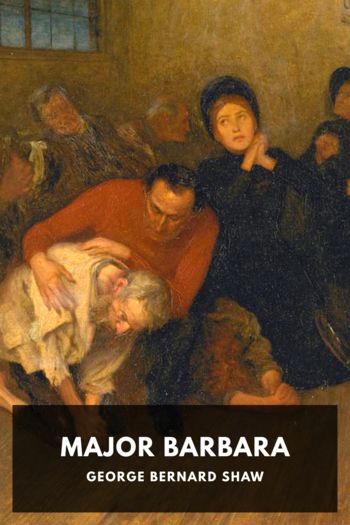Major Barbara by George Bernard Shaw (different e readers .TXT) 📕

- Author: George Bernard Shaw
Book online «Major Barbara by George Bernard Shaw (different e readers .TXT) 📕». Author George Bernard Shaw
Strangely enough, in the midst of this raging fire of malice, the one man who still has faith in the kindness and intelligence of human nature is the fulminator, now a hunted wretch, with nothing, apparently, to secure his triumph over all the prisons and scaffolds of infuriate Europe except the revolver in his pocket and his readiness to discharge it at a moment’s notice into his own or any other head. Think of him setting out to find a gentleman and a Christian in the multitude of human wolves howling for his blood. Think also of this: that at the very first essay he finds what he seeks, a veritable grandee of Spain, a noble, high-thinking, unterrified, malice-void soul, in the guise—of all masquerades in the world!—of a modern editor. The Anarchist wolf, flying from the wolves of plutocracy, throws himself on the honor of the man. The man, not being a wolf (nor a London editor), and therefore not having enough sympathy with his exploit to be made bloodthirsty by it, does not throw him back to the pursuing wolves—gives him, instead, what help he can to escape, and sends him off acquainted at last with a force that goes deeper than dynamite, though you cannot make so much of it for sixpence. That righteous and honorable high human deed is not wasted on Europe, let us hope, though it benefits the fugitive wolf only for a moment. The plutocratic wolves presently smell him out. The fugitive shoots the unlucky wolf whose nose is nearest; shoots himself; and then convinces the world, by his photograph, that he was no monstrous freak of reversion to the tiger, but a good looking young man with nothing abnormal about him except his appalling courage and resolution (that is why the terrified shriek “Coward” at him): one to whom murdering a happy young couple on their wedding morning would have been an unthinkably unnatural abomination under rational and kindly human circumstances.
Then comes the climax of irony and blind stupidity. The wolves, balked of their meal of fellow-wolf, turn on the man, and proceed to torture him, after their manner, by imprisonment, for refusing to fasten his teeth in the throat of the dynamiter and hold him down until they came to finish him.
Thus, you see, a man may not be a gentleman nowadays even if he wishes to. As to being a Christian, he is allowed some latitude in that matter, because, I repeat, Christianity has two faces. Popular Christianity has for its emblem a gibbet, for its chief sensation a sanguinary execution after torture, for its central mystery an insane vengeance bought off by a trumpery expiation. But there is a nobler and profounder Christianity which affirms the sacred mystery of Equality, and forbids the glaring futility and folly of vengeance, often politely called punishment or justice. The gibbet part of Christianity is tolerated. The other is criminal felony. Connoisseurs in irony are well aware of the fact that the only editor in England who denounces punishment as radically wrong, also repudiates Christianity; calls his paper The Freethinker; and has been imprisoned for two years for blasphemy.
Sane ConclusionsAnd now I must ask the excited reader not to lose his head on one side or the other, but to draw a sane moral from these grim absurdities. It is not good sense to propose that laws against crime should apply to principals only and not to accessories whose consent, counsel, or silence may secure impunity to the principal. If you institute punishment as part of the law, you must punish people for refusing to punish. If you have a police, part of its duty must be to compel everybody to assist the police. No doubt if your laws are unjust, and your policemen agents of oppression, the result will be an unbearable violation of the private consciences of citizens. But that cannot be helped: the remedy is, not to license everybody to thwart the law if they please, but to make laws that will command the public assent, and not to deal cruelly and stupidly with lawbreakers. Everybody disapproves of burglars; but the modern burglar, when caught and overpowered by a householder, usually appeals, and often, let us hope, with success, to his captor not to deliver him over to the useless horrors of penal servitude. In other cases the lawbreaker escapes because those who could give him up do not consider his breech of the law a guilty action. Sometimes, even, private tribunals are formed in opposition to the official tribunals; and these private tribunals employ assassins as executioners, as was done, for example, by Muhammad before he had established his power officially, and by the Ribbon lodges of Ireland in their long struggle





Comments (0)